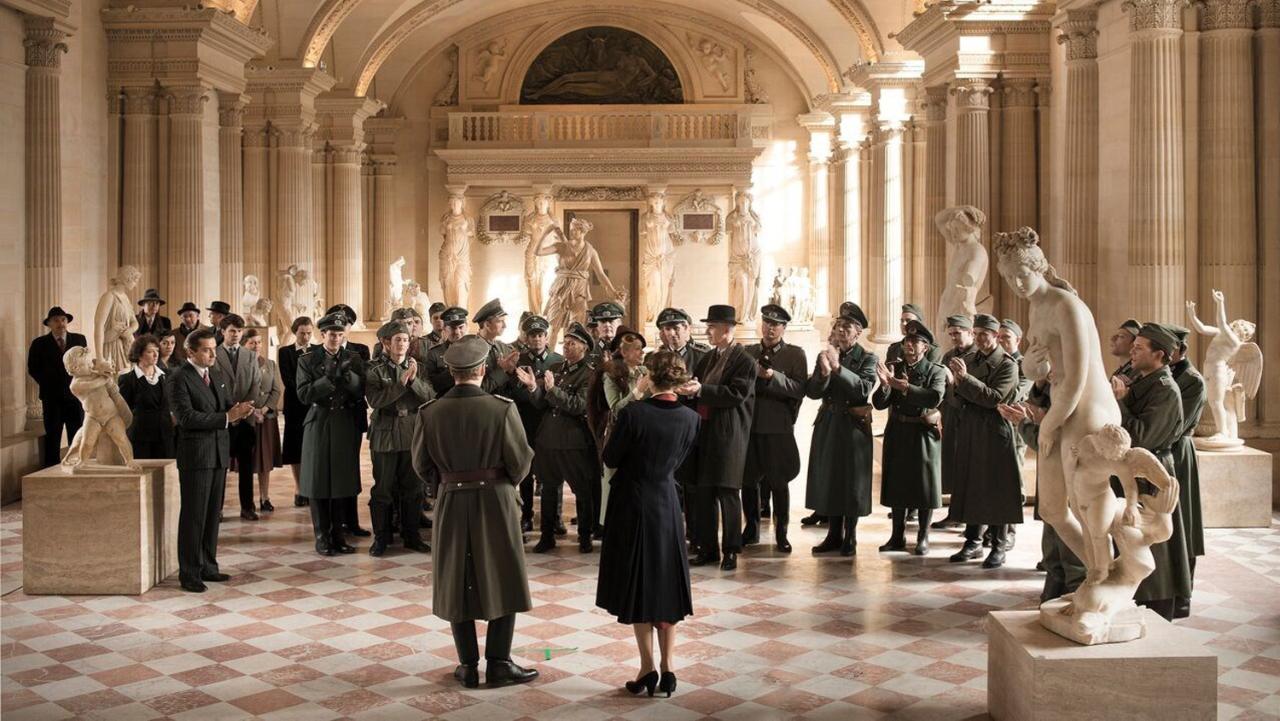FRANCOFONIA (Le Louvre sous l’occupation)
Music Box Films
Reviewed by: Harvey Karten, Shockya, d-based on Rotten Tomatoes
Grade: B
Director: Aleksandr Sokurov
Written by: Aleksandr Sokurov
Cast: Louis-Do de Lencquesaing, Benjamin Utzerath, Vincent Nemeth, Johanna Korthals Altes, Andrey Chelpanov
Screened at: Review 2, NYC, 3/16/16
Opens: April 1, 2016
If someone told you that a Nazi officer, a high-level man from the contingent of Germans occupying Paris during the early days of the Second World War, would ultimately be awarded France’s highest honor, you wouldn’t believe him. You might wonder if he’s a guy like Oskar Schindler, given a hero’s treatment in Steven Spielberg’s “Schindler’s List, but Franz Wolff-Metternich had nothing to do with the Holocaust. He was assigned by Hitler to ship the art works of the Louvre to Berlin, and Metternich seemed ready to comply. But when Metternich arrived at the museum, he discovered that all but a few sculptures had been moved out of Paris to be hidden in chateaus. Nor was this distinguished, highly educated and dare-we-say civilized, Francophone Nazi official about to take any action to deprive France of its greatest treasure.
“Francofonia” is Aleksandr Sokurov’s sequel to his “Russian Ark.” In that equally surrealistic narrative, Sokurov relates the tale of a 19th century French aristocrat, notorious for his scathing memoirs about life in Russia, who travels through the Russian State Hermitage Museum and encounters historical figures from the last 200+ years. That exceptional film made history of its own as perhaps the only full-length work filmed in a single take. “Francofonia” does not replicate that stunt, but it is likewise a highly imaginative, albeit slow-moving and occasionally pretentious narrative that uses archival film from the 1940’s as you might expect but employs actors to stand in for the principal performers as well, including Benjamin Utzerath as Franz Wolff-Metternich, Louis-Do de Lencquesaing as Jacques Jaujard, Vincent Nemeth as Napoléon Bonaparte, and Johanna Korthals Altes as Marianne, the ghost representing the French revolutionary ideals of freedom, equality, and brotherhood.
“Francofonia,” which bears a similar theme to Richard Berge and Bonni Cohen’s “The Rape of Europa” (about Nazi attempts to plunder Europe’s great works of art and the allied attempts to minimize the damage), is a meditation on the meaning of art. To Sokurov, a museum is not merely a place to store old paintings, which some philistine people might consider “dead museum pieces,” but is part of a culture’s DNA, its identity. Metternich, though a high-level German officer who could have complied with Hitler’s order and perhaps get himself a promotion and a fat pension, did not want to interfere with that concept. What’s French should remain French, notwithstanding that some of the art in the Louvre such as a sculpture of The Sphinx were themselves taken from foreign collections.
The principal segments of “Francofonia” find Metternich and his French counterpart, director of French museums Jacques Jaujard, conferring, in at least one case over a couple of demi-tasses like two old pals discussing philosophy. In this movie, Jaujard shows the representative of the occupation at least one chateau in which paintings were hidden, but Metternich refuses to take the action that Hitler commanded to ship the masterpieces out. As a result of Metternich’s cooperation with France, he was denazified at the end of the war, meaning that Jaujard commended the man highly for his action, thus preventing Metternich from being put on trial. In one imaginative scene, a ghost appears off camera to tell the duo what would happen in the future—that Jaujard would die of a heart attack at the age of seventy-two and Metternich at eighty-five.
For humor, such as it is, Napoleon appears, pointing to paintings of himself and responding “c’est moi.” Even for the Mona Lisa, same response: “c’est moi.” One scene finds Hitler arriving in Paris, looking around like a tourist at the Eiffel Tour, wherein Sokurov’s supplies the actual man with an imaginative conversation.
It’s refreshing to see how two people who might have been bitter enemies come together as like-minded people at a time that radical Islamic terrorists destroy statues representing the religions of “the infidel.”
Unrated. 88 minutes. © Harvey Karten, Member, New York Film Critics Online
Story – B+
Acting – B
Technical – B
Overall – B

